

As I complete my first 12 months as dean of our College of Agriculture and director of the Alabama Agricultural Experiment Station, I am humbled by the loyalty and dedication of our alumni, students, faculty and staff. The impact of this college and the AAES on communities and industries is really and truly the impact of these individuals.
The following pages offer a glimpse of the impact they have made in the year 2016 alone. In these pages, you’ll read examples of their research and its profound economic implications. You’ll meet students who are training and positioning to become global industry leaders. And you’ll learn about plans in motion to build upon our heritage in ways that will lead us through the next 100 years.
Success like we saw in 2016 happens when college families believe deeply in a mission. For us, that means improving lives, building stronger communities and ensuring these communities are equipped with the sustainable resources they will need for generations to come.
I believe this mission is at the heart of each of our success stories. I believe it is a personal mission for each member of our college family. It is my hope that, in 2017, this mission grows even stronger. With your support, I believe it can. I believe it will.
As we embark upon 2017, we are building toward a future greater than previous generations of our college family could have imagined. This is the time to honor them. This is the time to build upon our heritage of innovation, ensuring our impact tomorrow is even greater than today.
War Eagle!



Long-term climate change combined with weather phenomena such as El Niña and La Niña are having a significant impact on corn yields in Alabama, according to a journal article co-authored by Auburn University researcher Brenda Ortiz.
In the study—published in the July 19, 2016, issue of Nature—Ortiz and her research team analyzed 43 years of data to examine climate and non-irrigated corn yield in El Niña and La Niña years. They also looked at 33 years’ worth of records when analyzing changes in climate. The information came from three locations in Alabama and two in Georgia.
“When scientists have studied U.S. climate change trends, they’ve found that the Southeast has not been warming at the same rate as other areas of the country,” said Ortiz, associate professor in the Department of Crop, Soil and Environmental Sciences. “At specific locations within the region, we’re finding there is a significant warming trend compared with other areas.”
Impacts of climate change in a nationwide study showed a 15 percent potential decrease in corn yields for each degree increase in growing-season maximum temperature. However, weather-related variability in agricultural production is region-specific and can cut yields as much as 80 percent, Ortiz said.
Most corn production in Alabama is not irrigated, so the study has important implications for the state’s growers.

The sequencing of the channel catfish genome—considered one of the major milestones in the annals of Auburn University research—was detailed in the June 2, 2016, issue of Nature Communications, an international multidisciplinary journal.
“It is the first catfish genome sequence in the world, and the catfish has approximately 4,100 species,” said John Liu, associate provost and associate vice president for research at Auburn and professor in the School of Fisheries, Aquaculture and Aquatic Sciences.
The research is also a good model of university and government collaboration, with Auburn leading the project and significant contributions from the USDA–Agricultural Research Service in Mississippi.
The project is important to the future economic health of the U.S. catfish industry because every trait is controlled by the genome.
“Whether we are talking about growth rate, disease resistance, low-oxygen tolerance or feed-conversion efficiency, all of those traits are coded in the genome,” Liu said. “When we have the whole genome sequence, then we can use it as a template to determine the genomic locations for genes that control performance traits and select for fish with good genes.”
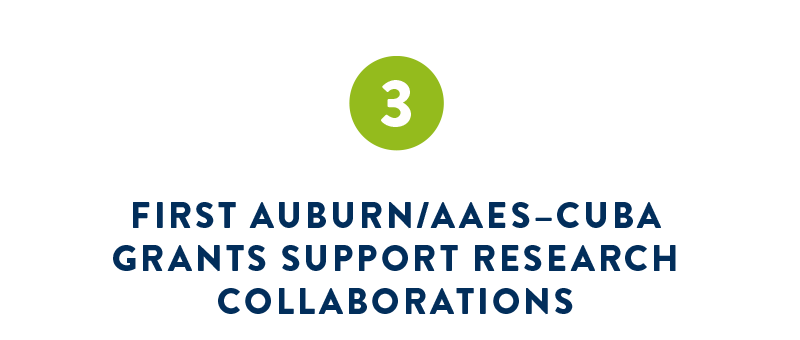
The new Auburn University/AAES–Cuba Grants Program funded its first six research projects in May 2016. The projects are collaborations between faculty of Auburn’s colleges of Agriculture and Human Sciences and faculty of the Agrarian University of Havana, the Cuban National Center for Animal and Plant Health and other agricultural research institutes in Cuba.
Henry Fadamiro, associate dean for research in the College of Agriculture and associate director of the Alabama Agricultural Experiment Station, described the one-year awards as small startup grants to fund cooperative projects that have the potential to attract more substantial future funding from extramural agencies.
“These seed grants will be used to leverage major grants from outside sources, such as USDA’s National Institute for Food and Agriculture, the U.S. Agency for International Development and the U.S. Department of State,” he said.
The 2017 call for Auburn/AAES–Cuba grant proposals will be open to any tenured or tenure-track faculty member at Auburn with an AAES or Alabama Cooperative Extension System appointment.

Arthur Appel, professor of entomology, was recognized in February 2016 as a fellow of the American Association for the Advancement of Science for his contributions to scientific innovation, education and leadership.
The international nonprofit organization was founded in 1848 and today is the world’s largest scientific society. It is dedicated to advancing science, engineering and innovation throughout the world for the benefit of all people. Appel is affiliated with the organization’s section on agriculture.
Appel is a University of California at Los Angeles alumnus with a B.A. in biology and holds M.S. and Ph.D. degrees in urban entomology from the University of California at Riverside. He joined the College of Agriculture faculty in 1985 and served as chair of the Department of Entomology and Plant Pathology from 2005 to 2013, when he was named interim associate dean for research in the college and interim assistant director of the Alabama Agricultural Experiment Station. He served as interim dean and director from July 2015 to February 2016.

Raising broiler chickens takes water—a lot of water--but rainwater harvesting could substantially reduce Alabama poultry growers’ dependence on municipal water sources or well water, reduce growers’ annual water bill by as much as $16,000, and pay for itself in as few as four to five years.
Gene Simpson, associate director of the National Poultry Technology Center at Auburn, said the NPTC has been investigating the merits of rainwater harvesting for poultry operations for about seven years.
The harvesting process includes a gutter system that funnels rainwater from the poultry house roofs into a 100- by 36-foot flexible bladder. A 2-inch rain on 82,000 square feet of roof space will fill the bladder to its 100,000-gallon capacity. A control room pumps the collected water to the houses as needed and will automatically switch over to municipal or well water in the event of an emergency.
Simpson said the quality of water through the harvesting system is excellent. “It is filtered multiple times, including through an ultraviolet light filter that kills any bacterial contamination,” he said.
Simpson is also a professor of agricultural economics in the College of Agriculture and a specialist with the Alabama Cooperative Extension System.

Researchers in the Department of Crop, Soil and Environmental Sciences have embarked on a project to offer production recommendations for Alabama farmers interested in growing crops such as malting barley and hops for the state’s growing craft beer industry.
The national and statewide growth of this industry continues to soar, but Alabama brewers would like more locally grown ingredients to enhance their products.
“Every Alabama brewer I have talked with is interested in an all-Alabama or all-Southeast-type product,” said Julie Howe, associate professor in the department. “They won’t brew all of their beers this way, but it might give them an edge over competitors.”
In 2016, Auburn researchers planted trial crops in locations throughout the state, “hoping to find some that may grow especially well in Alabama,” Howe said.
She said that while barley and hops are high-maintenance crops, they are potentially very profitable for Alabama growers interested in adding them to their crop mix.

With the goal of promoting collaboration in aquaculture and environmental science research and education, Auburn University and Ocean University of China established the OUC–AU Joint Center for Aquaculture and Environmental Sciences in November 2016.
The center is designed to bring together world-renowned research programs to address global environmental, economic and related issues that impact regions surrounding both institutions. The center is the result of a decades-long relationship between Auburn and OUC and will build on the schools’ shared strengths in fisheries, aquatic and environmental sciences.
A key element of the center’s work will be the OUC-AU grants program. Through the program, seed funding will be provided to OUC and Auburn scientists who propose cooperative research in the fields of aquaculture and environmental sciences.
“Auburn University has a long history of engagement with OUC in the areas of faculty and student exchanges and research collaborations,” said Henry Fadamiro, associate dean for research in the College of Agriculture and associate director of the Alabama Agricultural Experiment Station. “We look forward to realizing the research potential this latest collaboration represents.”



The College of Agriculture added a number of alumni to its volunteer student recruitment team in 2016—and is inviting more to join the team in 2017.
Michelle Bufkin, a 2016 agricultural communications graduate who has joined the college’s Student Services team as a full-time student recruitment coordinator, said that successful alumni who establish personal connections with prospective students can have strong influences on those students’ choices of college and major.
All recruiting events scheduled both on and off campus can be found at agriculture.auburn.edu/join-us.

Alumni interested in volunteering can contact Michelle Bufkin at michelle.bufkin@auburn.edu or call Student Services at 334-844-8900. Students interested in attending any recruitment events can register online at agriculture.auburn.edu/join-us.
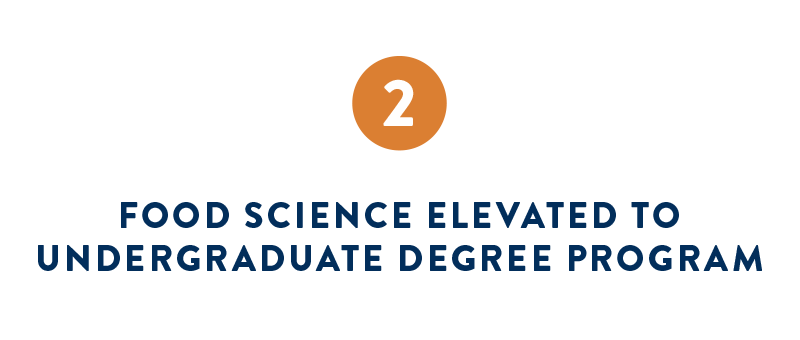
Auburn’s food science program got a major boost fall semester 2016 when it changed from a degree option in poultry science to a full-fledged bachelor of science degree.
The interdisciplinary degree program, approved by Auburn’s Board of Trustees in summer 2015 and by the Alabama Commission on Higher Education in December 2015, is administered by the Department of Poultry Science.
Food is a universal necessity, and the industry meeting that need must have competent, professional food scientists, said food science professor Leonard Bell.
“Consumers expect many things from their food, including health, safety, enjoyment and stability,” he said. “These attributes require understanding the science behind the ingredients, how they interact during processing and storage, potential sources of contamination, methods for preventing contamination and issues associated with quality perception.
“In other words, we need to understand the biology, chemistry and physics of the food, and the B.S. degree in food science will prepare students to address these needs.”
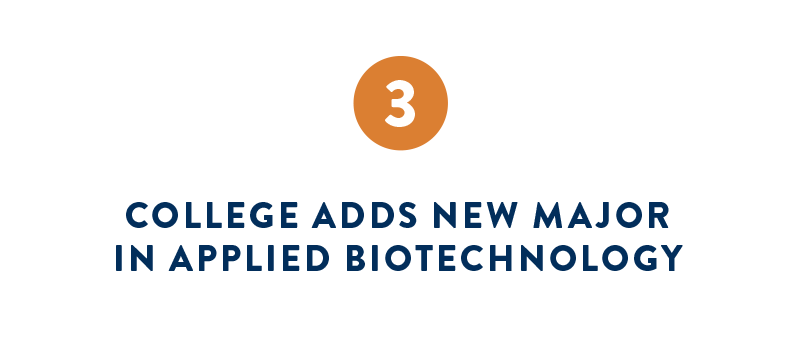
Students at Auburn University will have a new degree option next fall as the College of Agriculture offers a bachelor of science in applied biotechnology. The new major was approved by the Alabama Commission on Higher Education in December 2016.
“This is the first program of its kind in the state of Alabama and was developed in response to the rapid growth of the biotechnology industry,” said Paul Patterson, dean of Auburn’s College of Agriculture. “We believe this program will be an attractive option for a number of students pursuing careers in the advanced sciences.”
While the applied biotechnology program is housed in the Department of Entomology and Plant Pathology, it incorporates coursework from multiple departments and programs, including animal sciences, biosystems engineering, crop and soil science, environmental science, food science and horticulture.
The program’s curriculum was designed to prepare students for graduate studies or professional careers in fields such as biotechnology, agriculture and pharmaceutics.

Auburn students seeking service-oriented careers or opportunities were offered a new academic option in fall 2016 when the College of Agriculture introduced a minor in stewardship-based agriculture.
The program focuses on crop and animal production for small-scale, international and other alternative production systems, such as urban gardening.
“This program is for students not seeking careers in conventional large-scale farming but who wish to help feed and serve communities through many of the tools we offer,” said Paul Patterson, dean of the College of Agriculture.
Professor Elizabeth Guertal, one of the architects of the minor, said the program was developed in response to the number of Auburn tudents seeking humanitarian opportunities.
“Students were coming to us with a drive to do something for the greater good—to help improve the communities and the lives around them,” she said. “We designed this minor to prepare students of any academic background with a working knowledge of how they can apply agricultural principles to benefit communities that are less fortunate than them.”

Seven College of Agriculture students were among 62 undergraduates campuswide to whom Auburn’s Office of the Provost awarded 2016-17 Undergraduate Research Fellowships, which carry stipends ranging from up to $2,000 for semester-long research projects to up to $6,000 for one year.
Those seven, however, were far from the only Auburn agriculture students who gained valuable hands-on research experience throughout the year. Every department and school in the college offers opportunities for undergrads to strengthen their educational experience and their futures through research—either as volunteers, as paid student workers or for academic credit.
All students involved in undergraduate research projects work under the guidance of dedicated faculty mentors throughout the college. One of those individuals, plant pathology associate professor Leonardo De La Fuente, was presented the 2015-16 Provost’s Award for Faculty Excellence in Fostering Undergraduate Research and Creative Scholarship.
He is the second College of Agriculture faculty member to merit the award in its five-year history. The 2014-15 recipient was School of Fisheries, Aquaculture and Aquatic Sciences associate professor Alan Wilson.

France, China, Cuba, Spain, Mexico and Vietnam were just a few of the countries visited by students of the College of Agriculture in 2016. The travel was part of the college’s growing faculty-led study tour program, fueled by a scholarship designated for student global experiences.
“Now, more than ever, agriculture is truly a global field and the world’s largest industry,” said Henry Fadamiro, associate dean for research and recent assistant dean and director of global programs for the college. “Agriculture graduates are very likely to work for a multinational company or in an emerging international market after graduation. Study abroad gives students an opportunity to meet and work with people from different backgrounds and to experience other cultures first hand.”
The college’s largest study-abroad tour of 2016 was a 20-student group tour of China.
For more information on study-abroad opportunities, visit agriculture.auburn.edu/study-abroad.




Following approval from Auburn’s Board of Trustees, the College of Agriculture in 2016 began planning and preparations for a new Agricultural Sciences Research Building to be occupied by the departments of entomology and plant pathology, horticulture and crop, soil and environmental sciences.
The proposed 100,000-square-foot building will feature the latest in agricultural research and teaching laboratory space for production agriculture, geospatial information systems, modern genomic methods, plant production systems, teaching simulations and more. Paul Patterson, dean of the College of Agriculture, said the facility will be vital to the type of research, teaching and faculty and student recruitment necessary for moving the college forward.
“We are at a pivotal point in our history,” he said. “For generations, our college has made significant contributions to agricultural science and to the Alabama economy. To make these types of contributions a part of our future, we must advance the research and teaching facilities in which we work.”
The departments that will relocate to the new Agricultural Sciences Research Building currently occupy Funchess Hall, which is scheduled for demolition following construction of the new facility. Plans call for the Funchess footprint to become campus green space. No decision has been made on where the new facility will be located.

Construction of the Agricultural Sciences Research Building is contingent on the College of Agriculture's success in securing financial support.
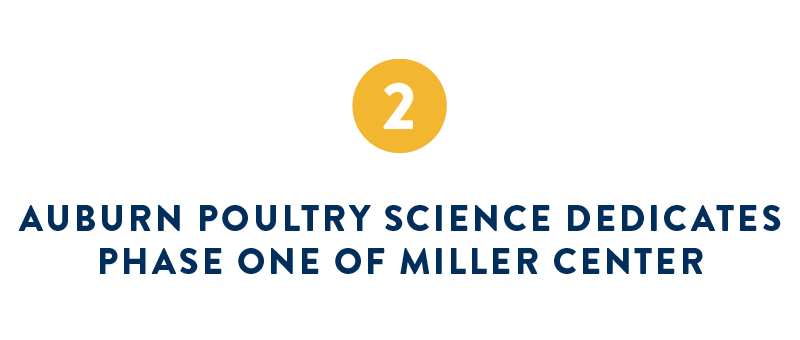
The Department of Poultry Science and the National Poultry Technology Center at Auburn completed phase one of construction of the new Charles C. Miller Jr. Poultry Research and Education in fall 2016 and celebrated that progress with the Miller family at a special ceremony Nov. 4.
Phase one included two poultry research houses and a poultry equipment testing and evaluation house. The testing and evaluation house is the only facility in the nation dedicated solely to testing and refining equipment to improve poultry farming efficiency and profitability.
The new complex, located north of Auburn’s main campus, will be a comprehensive, state-of-the-art poultry research and teaching facility. It is adjacent to the feed mill, formally called the Poultry and Animal Nutrition Center, that opened in 2012.
The new facility’s namesake, Charles C. Miller Jr., was a forward-thinking poultry industry pioneer who earned a textile engineering degree from Auburn in 1938, followed two years later by a degree in agricultural business and economics. His son, Charles C. “Buddy” Miller III, and daughter-in-law Pinney Allen have supported construction of the center through a $2.5 million gift in honor of Miller III’s parents.

With completion of phase one of the Charles C. Miller Jr. Poultry Research and Education Center construction in fall 2016, Auburn's Department of Poultry Science and National Poultry Technology Center immediately began the second phase.
Phase two will begin with an administrative building, a hatchery and a research and educational processing plant. Efforts to raise the $4.5 million required for the facilities are in progress. Cash and pledges as well as gifts of equipment and technology are welcomed. Future plans for the Miller complex include a pilot processing plant, a broiler breeder house, multi-use research houses, chamber facilities, a layer house and a necropsy laboratory.
For more information or to make a gift toward Miller Center construction, contact the College of Agriculture Office of Development at 334-844-1475 or coagdev@auburn.edu.

The College of Agriculture welcomed 14 new faculty members to seven of its academic units in 2016. “All of these new members of our college family were carefully selected for their impressive credentials and depth of experience in their respective fields,” Dean Paul Patterson said. “I believe they will distinctively enhance our academic and research programming while supporting the agricultural industry of this region.”
DIANNA V. BOURASSA Extension specialist & assistant professor of poultry processing Department of Poultry Science Ph.D.—University of Georgia, 2013 Previously served as a research technician for the USDA–ARS National Poultry Research Center, Athens, Georgia.
GEORGE S. “TREY” CUTTS Extension agronomist & assistant professor of cotton cropping systems Department of Crop, Soil & Environmental Sciences Ph.D.—Texas A&M University, 2013 Previously served as a line development breeder for Monsanto in South Africa.
BRENDAN T. HIGGINS Assistant professor of scalable energy conversion & technology Department of Biosystems Engineering Ph.D. —University of California, Davis, 2014 Previously served as a post-doctoral researcher at the University of California, Davis.
JENNY D. KOEBERNICK Assistant professor of plant breeding Department of Crop, Soil & Environmental Sciences Ph.D.—Texas A&M University, 2010 Previously served as a post-doctoral research fellow at the Commonwealth Scientific & Industrial Organization in Australia.
EMIR MALIKOV Assistant professor of quantitative methods Department of Agricultural Economics & Rural Sociology Ph.D.—State University of New York at Binghamton, 2014 Previously served as an assistant professor of economics at St. Lawrence University in Canton, New York.
SONIA J. MOISA Assistant professor of beef cattle production management Department of Animal Sciences Ph.D.—University of Illinois, 2015 Previously served as a post-doctoral research assistant at Kansas State University.
JEREMY M. PICKENS Extension horticulturist Department of Horticulture Ph.D.—Auburn University, 2015 Previously served as a research associate in aquaponics for the horticulture department.
NEHA POTNIS Assistant professor of molecular ecology & plant pathology Department of Entomology & Plant Pathology Ph.D.—University of Florida, 2011 Previously served as a research plant pathologist for the USDA–ARS Vegetable Laboratory in Charleston, South Carolina.
TYLER N. SANDLIN Extension specialist Department of Crop, Soil & Environmental Sciences M.S.—Mississippi State University, 2011 Previously served as a regional extension agent at the Tennessee Valley Research and Extension Center in Belle Mina.
HARLES W. STARKEY Assistant professor of poultry production Department of Poultry Science Ph.D.—Kansas State University, 2002 Previously served private corporations, including DSM Nutritional Products, American Proteins Inc. and Balchem Corp.
DI TIAN Assistant professor of agroclimatology Department of Crop, Soil & Environmental Sciences Ph.D.—University of Florida, 2014 Previously served as a post-doctoral fellow at Princeton University.
EDGAR L. VINSON III Extension specialist Department of Horticulture Ph.D.—Auburn University, 2016 Previously served as a horticulture research associate in vegetable and fruit production at Auburn.
MATTHEW N. WATERS Assistant professor of environmental science Department of Crop, Soil & Environmental Sciences Ph.D.—University of North Carolina at Chapel Hill, 2007 Previously served as an assistant professor at Shorter and Valdosta State universities in Georgia.
GEOFFREY R. WILLIAMS Assistant professor of insect pollination & apiculture Department of Entomology & Plant Pathology Ph.D.—Dalhousie University, Halifax, Nova Scotia, 2013 Previously served as a senior research associate at the University of Bern in Switzerland.

Paul Patterson
Dean, College of Agriculture
Henry Fadamiro
Associate Dean for Research,
College of Agriculture
Paul Mask
Associate Dean for Extension,
College of Agriculture
Amy Wright
Interim Associate Dean for Instruction,
College of Agriculture
Paul Patterson
Director, AAES
Henry Fadamiro
Associate Director, AAES
Janaki R.R. Alavalapati
Dean, School of Forestry & Wildlife Sciences
Associate Director, AAES
Nicholas Giordano
Dean, College of Sciences & Mathematics
Associate Director, AAES
June Henton
Dean, College of Human Sciences
Associate Director, AAES
Calvin Johnson
Dean, College of Veterinary Medicine
Associate Director, AAES
Dale Monks
Director of Outlying Units, AAES
Agricultural Economics & Rural Sociology
Animal Sciences
Biosystems Engineering
Crop, Soil & Environmental Sciences
Entomology & Plant Pathology
Fisheries, Aquaculture & Aquatic Sciences
Horticulture
Poultry Science
College of Agriculture
School of Forestry & Wildlife Sciences
College of Human Sciences
College of Sciences & Mathematics
College of Veterinary Medicine
Aquaculture & Fisheries Business Institute
Auburn University Food Systems Institute
Center for Bioenergy & Bioproducts
Hunger Solutions Institute
National Poultry Technology Center
Water Resources Center

Office of the Dean/Director
107 Comer Hall
Auburn, AL 36849-5401
334-844-2345
Black Belt Research & Extension Center
Marion Junction
Brewton Agricultural Research Unit
Brewton
Chilton Research & Extension Center
Clanton
E.V. Smith Research Center
Shorter
Gulf Coast Research & Extension Center
Fairhope
Monroeville Agricultural Research Unit
Monroeville
North Alabama Horticulture Research Center
Cullman
Ornamental Horticulture Research Center
Mobile
Piedmont Research Unit
Camp Hill
Prattville Agricultural Research Unit
Prattville
Plant Science Research Center
Auburn
Sand Mountain Research & Extension Center
Crossville
Tennessee Valley Research & Extension Center
Belle Mina
Upper Coastal Plain Agricultural Research Center
Winfield
Wiregrass Research & Extension Center
Headland